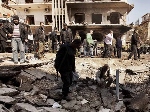Syria: A catastrophic failure of the international system
Published on Thu, 2016-09-01 19:01
After more than five years, the conflict in Syria represents a catastrophic failure of the “international system” in terms of maintaining basic human rights (including the right to live), peace and stability. This system, including the UN as well as influential world states and organizations, has failed to reduce the escalation of conflict, let alone create effective mediation processes to reach a decent solution. Furthermore, many international and regional actors have fueled the conflict by providing political, military, logistic and financial support to the warring parties, investing in identity politics to deepen polarization and strengthening hostility and a spirit of revenge in their local affiliates. The conflict has largely destroyed Syria’s economic structure, foundations and institutions, severely depleting resources and capital, human capital, social capital and economic governance. Economic priorities shifted as all subjugating powers reallocated resources to fuel violence and its related activities. This economic environment came along with the absence of rule of law, property rights, and accountability, in addition to a surge in corruption. It generated new actors and/or changed the behaviour of previous actors to be part of new rules of game: that of imposing hegemony by force and building new political economies to sustain the conflict. Effectiveness and equity, as goals of economic policy, have been diminished as the authorities sacrificed the core development goals and achievements to serve the new “development in reverse” dynamics. Source: Syria National Report, Social Watch Report 2016. » |
SUSCRIBE TO OUR NEWSLETTER



